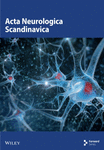Case report A reversible neuronal antibody (anti-Tr) associated paraneoplastic cerebellar degeneration in Hodgkin's disease
Abstract
Paraneoplastic cerebellar degeneration (PCD) has been associated with a variety of neoplasms, most commonly with gynecologic tumors, breast cancer, small cell lung cancer, and Hodgkin's disease (HD). In some patients PCD is associated with circulating antineuronal antibodies like anti-Hu, anti-Yo or anti-Ri. Previously, only 5 patients with a new antineuronal antibody called anti-Tr, proposed to be specific for HD, have been reported. We describe 1 further patient with HD and reversible PCD with a decline in anti-Tr antibody titers in cerebrospinal fluid and serum corresponding to the improvement of clinical symptoms. At the present time the immunoreactive pattern observed in rat cerebellum is the only way to identify anti-Tr antibodies and differentiate them from other antibodies that immunoreact with the Purkinje cells.




